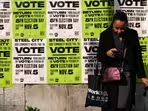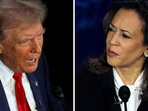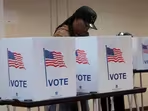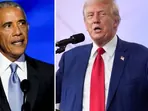On the ground, Kamala Harris bets big on independent voters, late deciders
North Carolina/Pennsylvania:Chip Walden had spent the afternoon researching Republican candidates up and down the ballot. And he did something he had never done before — vote for Democrats for every office, from the presidency to House to state governor to local bodies.
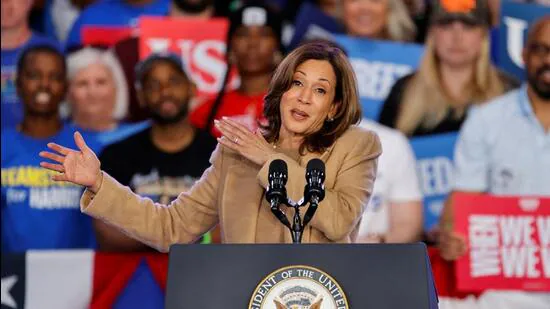
“I have never done this. I was born into a Republican family. But man, they have gone crazy. One candidate had called for executing (Barack) Obama and (Hillary) Clinton; one advocated for more and more armed guards in schools; one has said the most racist and vile of things; one has praised Nazis; most have refused to accept the 2020 results. I couldn’t find a single Republican I could justify voting for, and for the first time, I went straight for the Democratic ticket,” Walden said last week, perplexed at the change in the party.
Walden is a physician assistant and was born and raised in North Carolina’s Wilmington town, a part of the New Hanover county that voted for Donald Trump in 2016 and Joe Biden in 2020.
Over a beer with two friends in a downtown Wilmington bar, Walden said he had not spent too much time researching Kamala Harris. “It doesn’t really matter what she stands for. She probably has skeletons in her closet, which politician doesn’t? And we will have to bear the burden of whatever negative consequences she brings. But she won’t destroy the country. She won’t dismantle the government. She won’t make a laughingstock of America.”
Walden is exactly the kind of voter that the Harris campaign believes is changing the election dynamic in the final few weeks; the voter in a swing county of a swing state who is an independent, or even a Republican, but is too put off by the prospect of a Trump presidency or the “Make America Great Again” nativist movement to stick with Republicans in this cycle.
A New York Times/Siena poll published on Sunday added credibility to Harris campaign’s claims. The poll said that out of the eight percent voters who had decided on their vote only recently, 55% went with Harris and 44% with Trump. A similar trend may be at play even in entrenched Red states. In a credible but surprising local poll, propelled by a late surge, Harris was estimated to have a clear edge in Iowa, a Republican state with six electoral college votes. Trump had won the state in both 2016 and 2020.
Not all independent or moderate Republican voters have Walden’s clarity though and are grappling with their final dilemmas.
Bruce, a stock broker in the North Carolina’s Brunswick county, wasn’t quite sure what he would do in the polling booth. “I don’t like Trump’s rhetoric. I don’t like Harris’s policies. I wish we had other choices. But I absolutely intend to vote,” he said outside a gym.
Asked what issues were important to him, Bruce paused, and then told this reporter, “I hope you don’t mind but it is immigration. We need to control it.” Did he blame the Democrats, as Trump did? “Yes, but it is not just them. The Congress has to act too. It is a bipartisan issue.” For most people who rate immigration as a top issue, Trump is seen the more widely preferred candidate. But Bruce wasn’t sure. “He is unstable. He is foolish. He has no impulse control. But I wonder if her election will threaten security and the economy. It is a hard decision for me.”
Kiki expressed a similar predicament in Pennsylvania’s Allentown in Lehigh Valley, widely considered a bellwether region in a swing state and where both campaigns have invested tremendous resources.
“Kamala just got her name in and became the candidate because Biden was too old. She won’t have won the primary if she had to actually win the nomination. I don’t like that. I also blame Biden and Harris for the high prices. But I don’t trust Trump. He is rich. He says whatever he wants to. He is dangerous,” Kiki, who worked in a warehouse that processed goods imported from Vietnam, said.
Asked what would be a determining issue for him when he voted, Kiki said that he was agitated by America wasting money on foreign wars. “I really feel we have enough problems at home. We aren’t the world’s policeman. Why are we wasting money in Ukraine? But I don’t trust Trump. He may end the wars, but I don’t know if he will have America’s best interests at heart.” Kiki was increasingly veering towards voting for Congressional, state and local races but not voting for the presidential ticket at all.
The same Times/Siena poll that showed Harris gaining among late deciders showed Trump having narrowed the gap in Pennsylvania, perhaps the most critical of the swing states.
Only the results will tell whether the polls are true in their entirety or partially, or whether Harris campaign’s claims of the consolidation of independents and moderates behind the candidate are accurate or merely a way to change the narrative when Trump is being seen as the favourite.
But on the ground, what is clear is that there is a churn in voter attitudes. Voters, including Black and Hispanic men who have never voted for Republicans, are voting for Trump. And voters, including White men and White women who have never voted for Democrats, are voting for Harris. Many of them are deciding late. All of this, in turn, is a part of wider realignment of political forces and ideological worldviews underway in American politics. And it is this dynamism of the moment that makes the election hard to read and unpredictable.
Disclaimer: The copyright of this article belongs to the original author. Reposting this article is solely for the purpose of information dissemination and does not constitute any investment advice. If there is any infringement, please contact us immediately. We will make corrections or deletions as necessary. Thank you.
Title:On the ground, Kamala Harris bets big on independent voters, late deciders
Url:https://www.investsfocus.com

